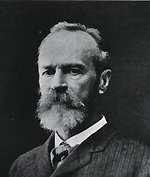The World That Darwin Made
Philosophy

William James (1842-1910), circa 1905
Part of American cultural landscape and based in Darwinism is the philosophical school known as pragmatism. In answer to the persistent question, “What is true and how does one know it?” American philosopher and psychologist William James (1842-1910) gave the truly Darwinian answer that what is true is what works. That is, ideas have a “struggle for existence” no less vital than anything else, and those ideas that in some good way correspond to reality and provide coherence and intellectual assent—not just for one, but for many—are the ideas that are true! Of course, the radical contingency of pragmatism comes out clearly, compared to traditional philosophical or theological notions. James explored how pragmatism might apply in the religious sphere in The Varieties of Religious Experience (1902); his emphasis on religion as lived, rather than religion as doctrine, remains influential in understanding the shape of religion in American society today.
Darwin’s influence is seen, too, in the writings of Friedrich Nietzsche (1844-1900). Early in his career Nietzsche became acquainted with Darwin’s thought through Friedrich Lange’s book Geschichte des Materialismus (History of Materialism, 1865). Darwin was but one of the examples Lange gave of the relentless spread of materialist views of nature and society. Nietzsche, who sought to undermine existing “social truths,” including widely accepted notions of religion and morality, saw Darwin as providing support for his ideas. Nietzsche wished to re-establish these notions on a more experiential, natural basis, unrestrained by convention, and derived solely from the human seizing of life at hand. His thought, difficult as it is to grasp, played into the 20th-century movements of existentialism and postmodernism, both of which deny any master plan to ethics, history, or even to science itself. At this extreme, Darwin’s own views--so appreciative of order and beauty in the world--can scarcely be recognized.
Last Reviewed: May 7, 2014


